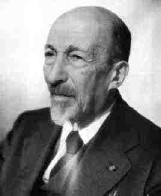

Jacques Hadamard's father was a teacher who taught several subjects such as classics, grammar, history and geography while Jacques' mother taught piano giving private lessons in their home. He grew up in Paris, but the family home was burned during the Franco-Prussian War.
Jacques began his schooling at the Lycée Charlemagne where his father taught. In his first few years at school he was good at all subjects except mathematics. Eventually he was winning prizes in many subjects in the national competition for school pupils. When Hadamard's father was transferred to another school, Jacques went with him. In 1882 he graduated. He was awarded first prize in algebra and first prize in mechanics in the Concours Général of 1883.
In 1884 Hadamard started attending École Normale Supérieure. Among his teachers were Tannery, Hermite, Darboux, Appell, Goursat and Picard. Already at this stage he began to undertake research, investigating the problem of finding an estimate for the determinant generated by coefficients of a power series. He graduated in 1888.
While undertaking research for his doctorate he worked as a school teacher.
Hadamard obtained his doctorate in 1892 for a thesis on functions defined by Taylor series.
In the same year Hadamard received the Grand Prix des Sciences Mathématiques for his paper Determination of the number of primes less than a given number.
In 1896 he was appointed as Professor of Astronomy and Rational Mechanics at Bordeaux.
The 4 years which he spent in Bordeaux were also extremely productive ones for Hadamard's research. He published 29 papers but they are remarkable more for their depth and the range of the topics which they covered rather than their number. Perhaps his most important result proved during this time was the prime number theorem, which he proved in 1896.
In the same year he published a major contribution to both geometry and to dynamics
that won the Bordin Prize of the Academy of Sciences.
Another result which Hadamard published during his time in Bordeaux was his famous determinant inequality of 1893. Matrices whose determinants satisfied equality in the relation are today called Hadamard matrices and are important in the theory of integral equations, coding theory and other areas.
In 1897 he resigned his chair in Bordeaux to take up lesser posts in Paris and write some books.
He continued to receive prizes for his research, and he was further honored in 1906 with election as President of the French Mathematical Society. Near the end of 1912 Hadamard was elected to the Academy of Sciences to succeed Poincaré.
Two of his sons were killed in World War I.
To push the pain of these tragedies away, he threw himself even more vigorously into mathematics. He travelled widely visiting the United States twice, Spain, Czechoslovakia, Italy, Switzerland, Brazil, Argentina, and Egypt. He continued to produce books and papers of the highest quality, publishing perhaps his most famous text Lectures on Cauchy's problem in linear partial differential equations in 1922. He also took up new topics, writing several papers on probability theory, in particular on Markov chains. He also published many articles on mathematical education and education in general. He wrote almost 300 scientific papers and books, as well as books for a wider audience.
After the start of World War II, Hadamard and his family escaped to the United States where he was appointed to a visiting position at Columbia University. A third son was killed in the war. Hadamard left the United States soon after and spent a year in England before returning to Paris as soon as was possible after the end of the war. After the war he became an active peace campaigner.
In 1962, when he was 96 years old, his grandson Étienne was killed in a mountaineering accident. This seemed to finally kill Hadamard's spirit and he did not leave his house after this, almost waiting to die.